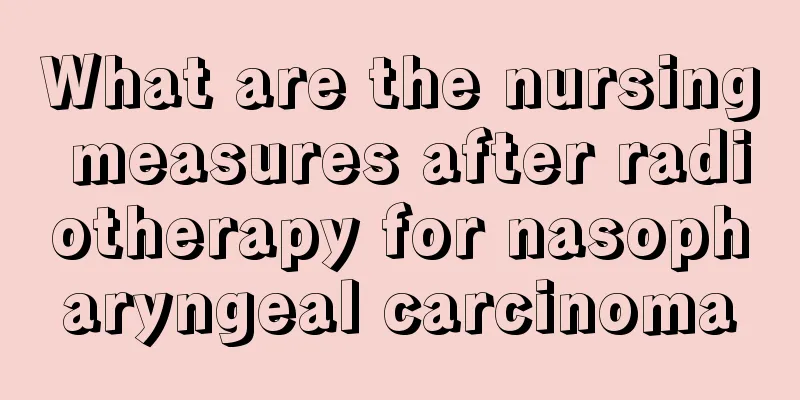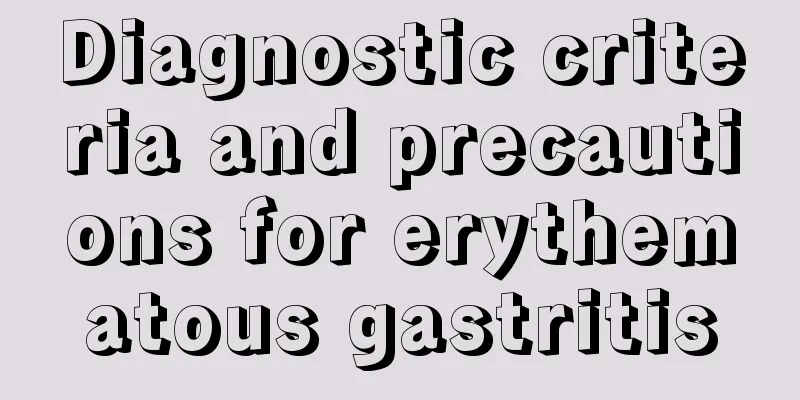What are the nursing measures after radiotherapy for nasopharyngeal carcinoma

|
At present, the first choice of treatment for nasopharyngeal carcinoma is radiotherapy. Therefore, if patients with nasopharyngeal carcinoma can master the self-care methods during radiotherapy, it can not only ensure the smooth progress of radiotherapy, but also reduce the economic burden, delay the progression of the disease, and improve the quality of life. So how should patients with nasopharyngeal carcinoma be cared for? 1. Self-psychological counseling methods Usually, after a nasopharyngeal cancer patient is diagnosed, radiotherapy is started before he has time to adjust his mentality. With the emergence of side effects of radiotherapy, the patient may become depressed, pessimistic, and lose confidence in treatment. During this period, the mood is unstable and fluctuates. I often ask myself, I didn't do anything bad, why did I get this unlucky disease, I feel desperate from time to time, or I am mentally calculating my funeral. It is normal to have these psychological activities. When you are sick, you can find someone to talk to, cry loudly, and lubricate. You should not keep unpleasant things in your stomach, but learn to conduct self-psychological counseling, self-regulate your mental state, learn some health and nursing knowledge, learn to arrange your life after the disease, understand the effect of radiotherapy, readjust the relationship with family, friends, colleagues, and leaders, maintain an open-minded and cheerful mood, divert attention from unpleasant reactions, cultivate a wide range of interests and hobbies, such as reading, painting, knitting sweaters, listening to music, etc., participate in social activities, and actively seek to enjoy a happy and happy life, so as to improve the quality of life. 2. Oral self-care methods During radiotherapy, since the parotid glands and salivary glands are within the irradiation range, the functions of the rib glands and salivary glands are suppressed after radiotherapy. The glandular secretion in the mouth decreases, and the self-cleaning function of the mouth disappears. Symptoms such as dry mouth, dry and painful throat, and oral ulcers are common. In order to alleviate these symptoms, you can always have a drinking bottle and moisten the mouth frequently. The daily water intake is more than 250 ml. You can often soak honeysuckle and ophiopogon in water to moisten the oral mucosa. In addition, in order to keep the mouth clean, you can prepare a light salt water to gargle 45 times a day. The preparation method of light salt is: add 34g (about half a spoon) of sodium chloride (cooked salt) to 500ml of warm boiled water, or gargle with Dobson solution. The gargle should be gargled for at least 1 minute each time. At the same time, rinse your mouth for 12 minutes with alternating cheek puffing and sucking movements to remove loose tartar ulcers. Spray watermelon frost spray or double throat spray locally, and open your mouth and teeth to allow sufficient gas exchange at the oral mucosal wrinkles, destroy the growth environment of anaerobic bacteria, and prevent secondary oral infection. Oral ulcer pain affects the eater. Use 0.1% cicaine compound vitamin B solution 30 minutes before meals, that is, 100ml of compound vitamin B solution + 5ml of 2% cicaine, and hold it in your mouth for 23 minutes to relieve pain and increase appetite. 3. Self-care methods for nasopharyngeal mucosa Because the nasopharyngeal mucosa is congested and swollen after irradiation, the nasal mucosal reaction similar to the oral mucosa occurs. Patients often have dry nasal mucosa, nasal congestion, increased and sticky nasal secretions, and severe cases can affect rest and sleep. Therefore, when the climate is dry, place a basin of water in the room to maintain a certain temperature in the room, and use cod liver oil or compound peppermint oil to drip the nose by yourself, 34 times a day, to protect the nasal mucosa. It is best to learn to correctly master the flushing method and commonly used liquids of the simple nasopharyngeal irrigator. The specific operation method is: put 100ml of flushing liquid in the nasopharyngeal irrigator, hold the nasopharyngeal irrigator in the right hand, slowly inject the flushing liquid from the nasal cavities on both sides alternately, and then spit it out from the mouth. After flushing, do not blow your nose hard to prevent the pressure in the nasopharyngeal cavity from increasing and secondary infection in other parts. At the beginning of radiotherapy, nasal irrigation should be performed 3 times a day, once in the morning before radiotherapy and once before going to bed. First rinse with warm water, then rinse with light salt water to remove secretions on the surface of the nasopharyngeal mucosa, reduce radiotherapy reactions, and increase the sensitivity of cancer cells to radiation. If there is a concurrent infection, rinse with 0.3% hydrogen peroxide instead. 4. Self-care methods for irradiated skin After radiotherapy, the skin in the radiation area atrophies and thins, and the soft tissue fibrosis and capillary dilation may occur. Radiation skin reactions may occur. Therefore, during radiotherapy, the local skin should be kept clean and dry. Sweat should be wiped off. Water ionization aggravates skin damage. High-necked or stiff-collared clothes should not be worn. The skin in the irradiated field should not be scrubbed with soap, rough towels or hot water. Avoid direct sunlight when going out. When peeling occurs, do not tear or scratch it with your hands. You can sprinkle borneol talcum powder on the affected area. Apply rescue oil to the affected area for wet reactions. Apply rescue oil to the affected area for wet reactions. Four times a day, local exposure, keep clean to prevent infection. In addition, the radiation field markings should be kept clear and must not be altered without permission, otherwise unnecessary damage will be caused. 5. Self-care methods for nasopharyngeal bleeding The nasopharynx is rich in blood vessels. Some nasopharyngeal tumors may cause ulcers when they grow to a certain extent, and local mucosal tissue damage caused by radiation may easily bleed. Therefore, do not pinch your nose, pick your nose, or blow your nose hard. If there is a small amount of bleeding, you can put an ice pack on the upper part of your nose or use furazolidone ephedrine nasal drops by yourself; if there is a large amount of bleeding, immediately tilt your head to one side, press the external carotid artery with your fingers to stop the bleeding, and quickly notify medical staff. 6. Reasonable adjustment of dietary structure during radiotherapy The ancients said: Food is the first necessity of the people. In fact, it means that the maintenance of human life depends on diet. When you have cancer, the growing cancer cells consume a lot of nutrients. In addition, the damage of radiation to the salivary glands of the oral mucosa during treatment and the nausea, vomiting, and abnormal taste caused by radiotherapy can affect appetite. In severe cases, it can lead to disordered nutrient metabolism. A reasonable diet can increase the body's tolerance and immunity to radiotherapy, slow down or inhibit the development of tumors, and facilitate the smooth completion of radiotherapy. Therefore, you should eat more protein with high nutritional value, complete essential amino acids, and good compatibility ratio, such as eggs, milk, fish and lean meat of animals, eat more fresh vegetables, fruits, soybeans and their products, peanuts, mushrooms, tomatoes, citrus, etc. Quit smoking, drinking and spicy food, do not eat smoked, fried, grilled, cured and pickled vegetables, consciously change bad lifestyles and bad habits, overcome various discomfort reactions, insist on eating, and ensure that radiotherapy is completed as planned. 7. Actively perform functional exercises After radiotherapy, the temporomandibular joint of the head and neck may be dysfunctional, and sometimes it may be difficult to open the mouth and the neck movement may be limited. In order to prevent these complications, during radiotherapy, you should do some appropriate activities according to your physical condition, such as deep breathing, outdoor walking, slow rotation of the left and right hands around the neck, mouth opening exercises such as holding a small round plastic bottle or a smooth small log in the mouth, and massage the temporomandibular joint, so as to improve your quality of life. |
<<: What are the nursing methods for nasopharyngeal carcinoma
>>: Nursing methods for nasopharyngeal carcinoma
Recommend
The efficacy of crab leg tea
In fact, for many people, crab leg tea is still v...
Experts explain liver cancer examination liver function test
Liver function tests are essential when examining...
What exactly is osteosarcoma
Many people want to know what osteosarcoma is, be...
Can nasopharyngeal carcinoma metastasize to bone cancer be cured?
Can nasopharyngeal carcinoma metastasis to bone c...
What tests should be done to check for breast cancer
Breast cancer examination is actually a very impo...
The difference between Songbei and Chuanbei
Songbei is a very precious tonic, while Chuanbei ...
How long after cold perm can I wash my hair
There are still many things to pay attention to a...
What should you pay attention to when your teeth get inflamed
It is very important to develop good habits of br...
MRI side effects
In the past, some examinations were diagnosed thr...
Is goat milk powder better than cow milk powder?
We all know that taking care of a baby is a great...
Treatment of complications in patients with pancreatic cancer
When patients are treated for pancreatic cancer, ...
How to diagnose thyroid cancer
How to diagnose thyroid cancer? Doing a good job ...
Recognize the symptoms of testicular cancer
As the incidence of various cancers has remained ...
How is chronic congestion of the pharyngeal cavity formed
The reason why the symptom of chronic pharyngeal ...
Why do the soles of my feet feel hot at night? Is it a disease?
Some parents of young children may find a strange...









